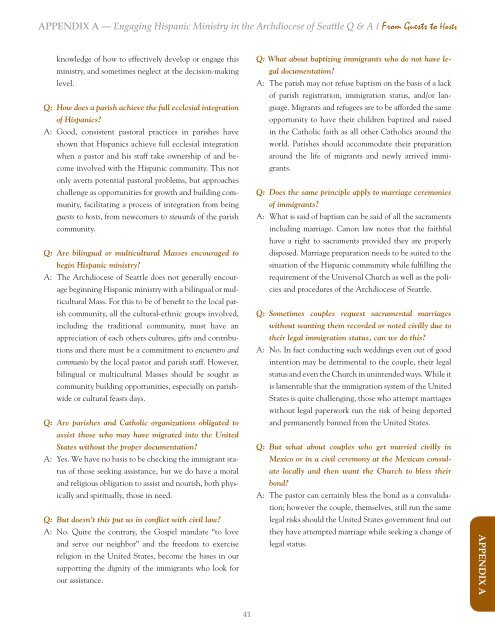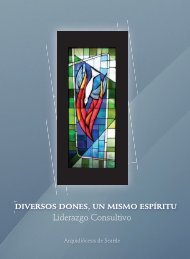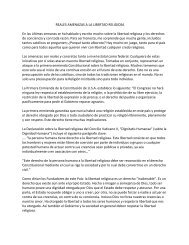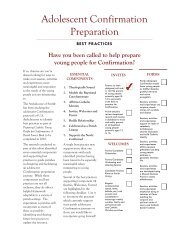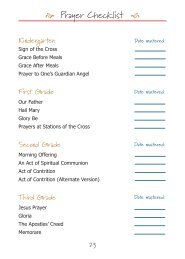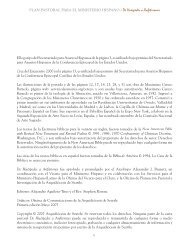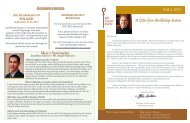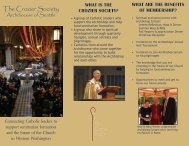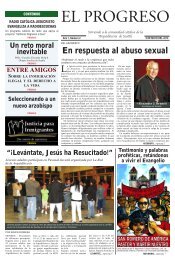Pastoral Plan for HisPanic Ministry / From Guests to Hosts Hispanic ...
Pastoral Plan for HisPanic Ministry / From Guests to Hosts Hispanic ...
Pastoral Plan for HisPanic Ministry / From Guests to Hosts Hispanic ...
You also want an ePaper? Increase the reach of your titles
YUMPU automatically turns print PDFs into web optimized ePapers that Google loves.
Appendix A — Engaging <strong>Hispanic</strong> <strong>Ministry</strong> in the Archdiocese of Seattle Q & A / <strong>From</strong> <strong>Guests</strong> <strong>to</strong> <strong>Hosts</strong>knowledge of how <strong>to</strong> effectively develop or engage thisministry, and sometimes neglect at the decision-makinglevel.Q: How does a parish achieve the full ecclesial integrationof <strong>Hispanic</strong>s?A: Good, consistent pas<strong>to</strong>ral practices in parishes haveshown that <strong>Hispanic</strong>s achieve full ecclesial integrationwhen a pas<strong>to</strong>r and his staff take ownership of and becomeinvolved with the <strong>Hispanic</strong> community. This no<strong>to</strong>nly averts potential pas<strong>to</strong>ral problems, but approacheschallenge as opportunities <strong>for</strong> growth and building community,facilitating a process of integration from beingguests <strong>to</strong> hosts, from newcomers <strong>to</strong> stewards of the parishcommunity.Q: Are bilingual or multicultural Masses encouraged <strong>to</strong>begin <strong>Hispanic</strong> ministry?A: The Archdiocese of Seattle does not generally encouragebeginning <strong>Hispanic</strong> ministry with a bilingual or multiculturalMass. For this <strong>to</strong> be of benefit <strong>to</strong> the local parishcommunity, all the cultural-ethnic groups involved,including the traditional community, must have anappreciation of each others cultures, gifts and contributionsand there must be a commitment <strong>to</strong> encuentro andcommunio by the local pas<strong>to</strong>r and parish staff. However,bilingual or multicultural Masses should be sought ascommunity building opportunities, especially on parishwideor cultural feasts days.Q: Are parishes and Catholic organizations obligated <strong>to</strong>assist those who may have migrated in<strong>to</strong> the UnitedStates without the proper documentation?A: Yes. We have no basis <strong>to</strong> be checking the immigrant statusof those seeking assistance, but we do have a moraland religious obligation <strong>to</strong> assist and nourish, both physicallyand spiritually, those in need.Q: But doesn’t this put us in conflict with civil law?A: No. Quite the contrary, the Gospel mandate “<strong>to</strong> loveand serve our neighbor” and the freedom <strong>to</strong> exercisereligion in the United States, become the bases in oursupporting the dignity of the immigrants who look <strong>for</strong>our assistance.Q: What about baptizing immigrants who do not have legaldocumentation?A: The parish may not refuse baptism on the basis of a lackof parish registration, immigration status, and/or language.Migrants and refugees are <strong>to</strong> be af<strong>for</strong>ded the sameopportunity <strong>to</strong> have their children baptized and raisedin the Catholic faith as all other Catholics around theworld. Parishes should accommodate their preparationaround the life of migrants and newly arrived immigrants.Q: Does the same principle apply <strong>to</strong> marriage ceremoniesof immigrants?A: What is said of baptism can be said of all the sacramentsincluding marriage. Canon law notes that the faithfulhave a right <strong>to</strong> sacraments provided they are properlydisposed. Marriage preparation needs <strong>to</strong> be suited <strong>to</strong> thesituation of the <strong>Hispanic</strong> community while fulfilling therequirement of the Universal Church as well as the policiesand procedures of the Archdiocese of Seattle.Q: Sometimes couples request sacramental marriageswithout wanting them recorded or noted civilly due <strong>to</strong>their legal immigration status, can we do this?A: No. In fact conducting such weddings even out of goodintention may be detrimental <strong>to</strong> the couple, their legalstatus and even the Church in unintended ways. While itis lamentable that the immigration system of the UnitedStates is quite challenging, those who attempt marriageswithout legal paperwork run the risk of being deportedand permanently banned from the United States.Q: But what about couples who get married civilly inMexico or in a civil ceremony at the Mexican consulatelocally and then want the Church <strong>to</strong> bless theirbond?A: The pas<strong>to</strong>r can certainly bless the bond as a convalidation;however the couple, themselves, still run the samelegal risks should the United States government find outthey have attempted marriage while seeking a change oflegal status.Appendix A41


